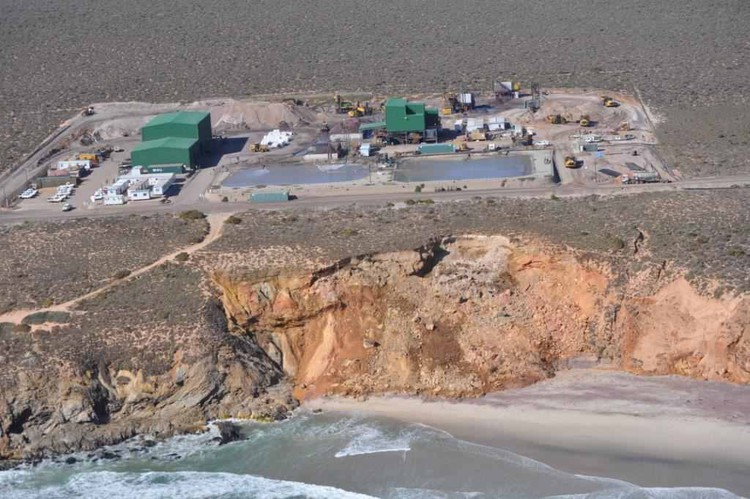Cape court to deliver vital environmental judgment
Will an Australian mine on the West Coast be held to account for allegedly causing a cliff to collapse?
All environmental eyes will be on the Western Cape High Court today (Monday).
Judge Owen Rogers is expected to deliver judgment on a review application brought by Australian-owned mining company Mineral Sands Resources (MSR), whose operations to extract heavy mineral sands like zircon, ilmenite, rutile, magnetite and garnet at its Tormin mine on the West Coast 400km north of Cape Town have attracted strong criticism and serious complaints about alleged environmental malpractices and illegalities. The major collapse of a sea cliff directly below the Tormin mine is a potent symbol of the mine’s alleged illegal activity.
MSR brought the review application after a search-and-seizure operation by government environmental officials in September last year, led by the Green Scorpions and initiated in response to the complaints. The mining company argued that the government’s new One Environmental System, introduced in December 2014 to reduce bureaucracy and improve efficiencies in managing environmental components of the mining industry, had passed exclusive jurisdiction for compliance monitoring and enforcement of environmental authorisations for all prospecting and mining operations to the Department of Mineral Resources. The environmental officials therefore had no legal standing to conduct the search-and-seizure and the warrant that authorised the raid was illegal, the company’s lawyers argued in court.
Charges in connection with alleged breaches of environmental law and regulations at Tormin are being investigated by police, and today’s judgment is likely to be formative in whether a criminal prosecution will be instituted against MSR. But environmental lawyers are expecting the judgment to also help resolve serious differences of interpretation about legal jurisdiction for the environmental management of South Africa’s mining industry as a whole, and particularly within the one kilometre protected coastal zone.
Irrespective of the outcome of the review application, the Tormin operation is also being challenged by the Centre for Environmental Rights (CER) – a non-profit NGO that helps communities and civil society organisations realise their Constitutional right to a healthy environment. The Centre was among those who submitted formal complaints about Tormin’s alleged environmental breaches.
On 31 January, CER wrote an “urgent” letter to Mineral Resources Minister Mosebenzi Zwane, saying it believed that MSR was conducting its Tormin mining operation in contravention of the Mineral and Petroleum Resources Development Act (MPRDA), as well as violating material conditions of its mining rights and contravening conditions of its environmental authorisation. “These unlawful operations are causing significant and ongoing harm to the environment.” (Some of these allegedly unlawful operations featured in the review application.)
The CER called on Zwane “immediately to exercise his powers in terms of section 47 of the MPRDA and cancel or suspend MSR’s mining rights, in order to prevent further irreparable damage to our coastal environment”.
As of last week, the minister had not replied to the letter, and Zwane’s spokesman, Martin Madlala, did not reply to a request for comment by this writer.
The CER also wrote a letter last month to SRK Consulting, a company that specialises in environmental consulting to the mining industry and that is conducting an environmental impact assessment (EIA) for MSR’s proposed extension to its Tormin mine. The letter points out that SRK notified interested and affected parties of MSR’s intention to extend mining operations through an amendment of its existing mining rights and EMPr (environmental management programme), and that this would trigger activities requiring environmental authorisation and an EIA process.
CER says it’s clear that the areas covered by the proposed “amendment application” are areas where the company’s previous applications for prospecting rights and environmental authorisation were refused by the Mineral Resources department. “It appears that MSR is now engaged in a cynical attempt to circumvent these refusals through an application to amend its existing mining rights in terms of section 102 of the MPRDA… Please consider this letter as advance notice that, should your client [MSR] persist in its section 102 application, we will lodge an objection thereto. In the event that the application is nevertheless successful, we will also challenge such decision.”
Asked to comment, SRK’s Scott Masson said the company was following a statutory Environmental Impact Assessment (EIA) process. “As part of that, we will provide responses to all comments received, including CER’s comment, in a summary of issues and responses released with the Scoping Report, which we plan to release for public comment later this month. We have, however, provided CER with an interim response… SRK cannot add much more at this point.”
MSR spokeswoman Anne Dunn said the mining company did not wish to respond to questions relating to the CER’s letters.
Support independent journalism
Donate using Payfast

Don't miss out on the latest news
We respect your privacy, and promise we won't spam you.
Next: Police stop anti-immigrant march in Rosettenville
Previous: Free Zimbabwean contraceptives smuggled for sale in South Africa
© 2017 GroundUp. 
This article is licensed under a Creative Commons Attribution-NoDerivatives 4.0 International License.
You may republish this article, so long as you credit the authors and GroundUp, and do not change the text. Please include a link back to the original article.

